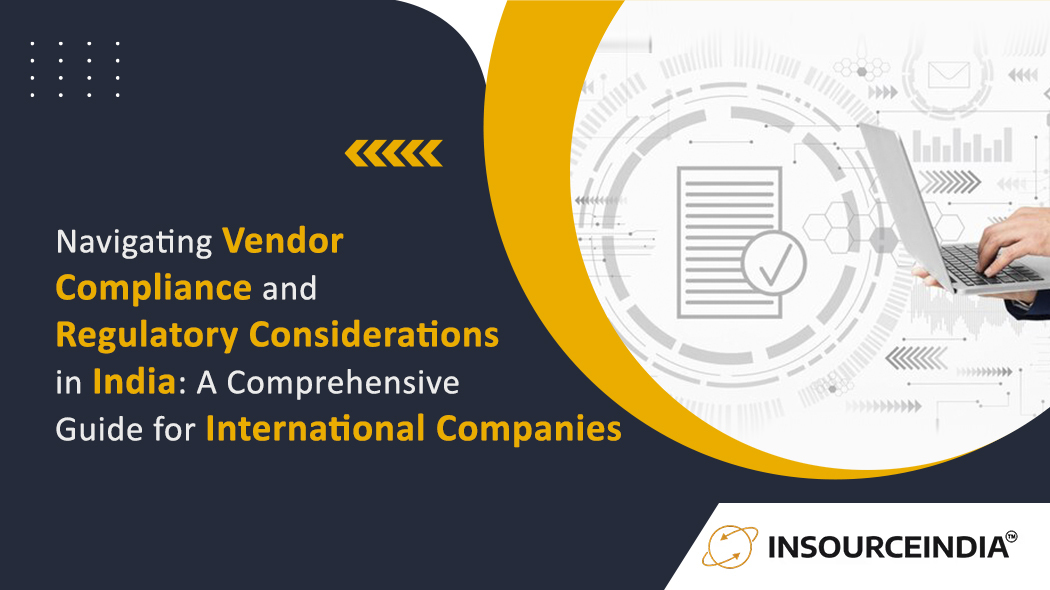In recent years, India has emerged as a hub for international businesses looking to expand their operations offshore. With its large pool of skilled talent, favourable business environment, and robust infrastructure, India offers numerous opportunities for growth and expansion. However, before diving headfirst into establishing offshore operations, international companies must carefully navigate the vendor compliance and regulatory landscape in India. In this comprehensive guide, we’ll delve into the key considerations and best practices for ensuring compliance and mitigating risks when setting up vendor relationships in India.
Understanding Vendor Compliance in India:
- Legal and Regulatory Framework: India’s legal and regulatory framework for vendor compliance is multifaceted and complex, encompassing various laws and regulations at the national, state, and local levels. International companies must familiarize themselves with these regulations to ensure seamless operations and avoid legal liabilities.
For instance, the Companies Act, 2013, governs the incorporation, management, and operation of companies in India, while the Goods and Services Tax (GST) Act regulates taxation on the supply of goods and services. Additionally, the Foreign Exchange Management Act (FEMA) governs foreign exchange transactions, which is crucial for international businesses operating in India.
- Taxation and GST Compliance: Goods and Services Tax (GST) is a crucial aspect of vendor compliance in India. It is a comprehensive indirect tax levied on the supply of goods and services at each stage of the supply chain. International companies must register for GST and comply with the applicable tax rates and regulations. Failure to comply with GST regulations can lead to penalties, fines, and legal consequences. Therefore, it’s essential for companies to stay updated on changes in GST laws and ensure timely filing of returns and payment of taxes.
- Data Protection and Privacy Laws: With the proliferation of digitalization and data-driven business models, data protection and privacy laws have become increasingly important. In India, the data protection landscape is evolving, with the introduction of the Personal Data Protection Bill, 2019 (PDP Bill). The bill aims to regulate the processing of personal data and establish a framework for the protection of individual privacy rights. International companies must ensure compliance with data protection laws and implement robust data security measures to safeguard sensitive information. Non-compliance with data protection regulations can result in reputational damage, financial losses, and legal liabilities.
- Labor Laws and Employment Regulations: India has a comprehensive framework of labour laws governing various aspects of employment, including wages, working conditions, and social security. International companies must comply with these laws when engaging vendors and contractors to ensure fair labour practices and avoid disputes. Key legislations include the Industrial Disputes Act, 1947, Minimum Wages Act, 1948, and Employee Provident Fund (EPF) Act, 1952. By adhering to labour laws and employment regulations, companies can build trust and maintain positive relationships with vendors and employees.
Best Practices for Vendor Compliance in India:
- Due Diligence and Vendor Screening: Conducting thorough due diligence and background checks on prospective vendors is essential to assess their reputation, financial stability, and compliance track record. International companies should verify vendor credentials, licenses, and registrations to ensure regulatory compliance and mitigate risks associated with non-compliant vendors. Additionally, companies should evaluate vendors based on their experience, expertise, and alignment with business objectives to make informed decisions.
- Clear Contractual Agreements: Establishing clear contractual agreements is crucial for defining the rights, responsibilities, and obligations of both parties involved in the vendor relationship. Contracts should include clauses pertaining to compliance with laws and regulations, indemnification, dispute resolution mechanisms, and termination provisions. By documenting the terms of the agreement upfront, companies can mitigate disputes and ensure accountability in case of non-compliance or breaches.
- Regular Audits and Monitoring: Implementing regular audits and monitoring mechanisms is essential to assess vendor compliance and identify potential risks or non-compliance issues. Companies should conduct periodic reviews of vendor performance, adherence to contractual agreements, and compliance with legal and regulatory requirements. By monitoring changes in regulatory requirements and industry standards, companies can proactively address compliance issues and mitigate risks associated with vendor relationships.
- Invest in Compliance Training: Providing comprehensive compliance training to internal stakeholders and vendor partners is essential to ensure awareness of legal and regulatory requirements. Companies should educate employees and vendors about their compliance obligations, ethical business practices, and the consequences of non-compliance. By fostering a culture of compliance within the organization, companies can promote transparency, integrity, and accountability in their vendor relationships.
Navigating vendor compliance and regulatory considerations in India requires careful planning, diligence, and adherence to legal and regulatory requirements. International companies must understand the legal framework, taxation laws, data protection regulations, and labor laws governing vendor relationships in India. By implementing best practices such as due diligence, clear contractual agreements, regular audits, and compliance training, companies can mitigate risks and ensure smooth business operations in India’s dynamic business environment.
Sources:
-
Companies Act, 2013 – Ministry of Corporate Affairs, Government of India
-
Goods and Services Tax (GST) Act – Central Board of Indirect Taxes and Customs (CBIC), Government of India
-
Foreign Exchange Management Act (FEMA) – Reserve Bank of India (RBI)
-
Personal Data Protection Bill, 2019 – Ministry of Electronics and Information Technology, Government of India
-
Industrial Disputes Act, 1947 – Ministry of Labour and Employment, Government of India
-
Minimum Wages Act, 1948 – Ministry of Labour and Employment, Government of India
-
Employee Provident Fund (EPF) Act, 1952 – Employees’ Provident Fund Organisation (EPFO), Government of India

